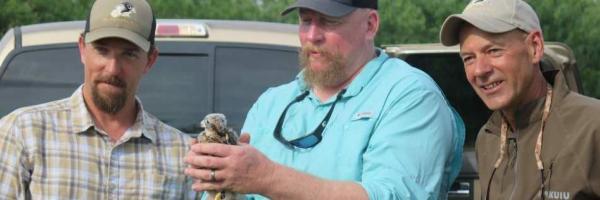BOISE, Idaho (6 June 2019) – Twenty-four years may seem like a long time to humans, but when it comes to recovering a species that had completely disappeared in the United States, that time tends to fly. Yesterday morning, a team of The Peregrine Fund’s biologists marked a great conservation success when they banded a young Aplomado Falcon nestling. This nestling was the 500th to be banded in southern Texas since 1995.
Prior to 1995, no wild Aplomado Falcons had hatched in the United States since at least the 1950s. The species had been extirpated (extinct from part of its original range) from the U.S. due to habitat loss. In the 1980s and 1990s, The Peregrine Fund began reintroducing the Aplomado Falcon to South Texas by releasing juvenile falcons bred at the conservation organization’s headquarters in Boise, Idaho. Artificial nesting platforms were innovated to keep Great Horned Owls from preying on Aplomado nestlings, habitat was managed to provide better natural nesting sites, and partnerships were formed with state agencies and landowners to ensure success.
Chris Parish, Director of Global Conservation for the Fund states, “The banding of this 500th nestling demonstrates that persistence and commitment lead to progress in achieving goals, not just our goals, but the shared goals of those who, in the words of The Peregrine Fund’s late founder Tom Cade, "strive to keep the earth fit for life in all its many splendored forms." Peregrine Fund biologist Brian Mutch adds, “One of the biggest challenges in all conservation is keeping the eye on the prize and keeping that vision clear for all. These efforts take time, and even the smallest steps can seem insurmountable. That's why we celebrate days like these.”
Indeed it was a celebration! Parish recalls, “We had members of many or our cooperators and more notably, many young folks, interns, seasonal employees, researchers, and members of the press present. The looks in their eyes and the obvious, tangible energy said it all. Upon checking out through a Border Patrol checkpoint, we heard about it again when the agent asked us what we were up to. We told him we were banding Aplomado Falcons and he said, ‘oh, the kids that came out ahead of us were glowing and obviously excited about what they had just been a part of.’”
When asked about the future of Aplomado Falcons, Peregrine Fund biologist Paul Juergens responded, “Habitat is key. For this species to succeed, we have to manage the landscapes in a way that gives them the best shot at success in a time of rapid and sometimes devastating change. To do so we use what we learn, the resulting science produced by studying the species, and share that with landowners and land managers who then join us to make the project a success. Tagging this 500th chick suggests it can work.”
The Aplomado Falcon project is a cooperation of many partners and supporters including the U.S. Fish and Wildlife Service, U.S. Fish and Wildlife Service Private Stewardship Program, U.S. Fish and Wildlife Service Coastal Bays and Estuaries Program, U.S. National Park Service, Texas Parks and Wildlife Department, Laguna Atascosa National Wildlife Refuge, Matagorda Island National Wildlife Refuge, Palo Alto Battlefield National Historic Site.
For more information, contact:
Erin Katzner
Director of Global Engagement
Main Phone: 208-362-3716
Direct Phone: 208-362-8277






